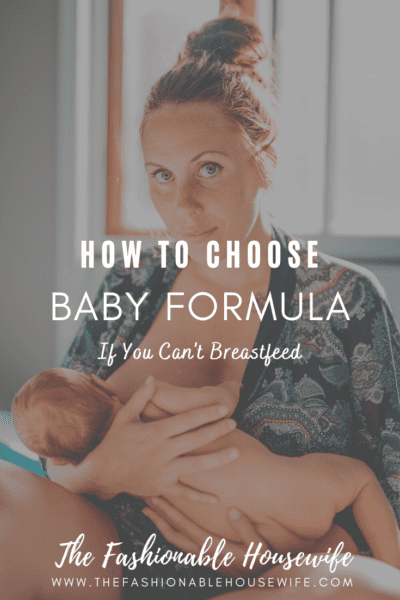
Let’s face it, if you are like most moms, considering all the different options and decisions you have to make as you prepare for your little one’s arrival has felt quite overwhelming. And if your little one is already here; you know the decisions and options are still surrounding you every day you walk through the baby section at your local grocery store.
Perhaps you plan on breastfeeding and thinking about formula isn’t even on your mind, or maybe you tried breastfeeding and there were complications, or maybe you need to formula feed in order to take a certain medication or prepare for surgery. No matter the reason, you are a mom, and you are loved regardless of how you came to this article. My hope is to simply provide a couple of quick and clear thoughts to consider as you choose a baby formula, and for you to thoroughly research the ideas further on your own. So, let’s get started!
1. Consider the Ingredients

This may seem basic, but there is a lot of “stuff” that goes into baby formulas. Some of those ingredients may seem perfectly harmless (I mean why would they place something inside of a baby food that could be bad, you might ask), but be cautious.
Research is constantly developing, and many manufacturers might not have the latest facts as they continue production. For example, in the 1990’s there was a huge push for lactose-free formulas with a soy base. Many people were told soy is a health food, and parents looking for a healthy formula thought soy would be the best choice. Years and plenty of research later, we are learning there could be terrible effects of soy on developing boys and girls. For a developing child, ingredients really do matter most. Just do your due diligence to research the ingredients that are on that formula label.
2. Consider the Environment

If you want an environmentally friendly formula, there are options to consider. For example, if they use palm oil, where do they source that palm oil from? But this environment question isn’t simply about eco-friendly, it’s about the decision of organic or non-organic formula, as well as European vs American formula.
When digging into the differences between organic and non-organic formula, definitely consider the EU and American standards. Non-organic formula from the EU is typically at a higher standard and level than the non-organic formula in the states. Plus, the EU organic formulas are usually regarded as higher standards than in the states as well. Much of these differences have to do with the regulations in place for baby food products that the EU abides by. Remember, the EU is comprised of many different countries, which means the regulatory standards have more input and tend to be stricter. When looking for the best quality for your baby, higher standard regulations is always a positive.
3. Consider Your Baby’s Needs

If your baby is still enjoying the warmth of momma’s womb, it’s hard to know the exact needs he/she may have. Some babies are more sensitive than others and may need a more sensitive formula, based on their reactions, whereas some babies are perfectly fine with the most popular cow’s milk brands. Just be aware that there are many options based on the sensitivity and many brands to help your baby. Speak with your pediatrician to help guide your decisions, but always come prepared with the research beforehand to ask more pointed questions.
One more thing to consider, when addressing your baby’s needs, is the stage of baby formula. If you do choose EU formulas, understand that the EU breaks their infant formula into two (or three) separate stages for the first year, instead of one single stage like in the states. The reasoning is to help better adapt formulas for the developing baby’s body. As a parent, you can clearly see the difference between your 6-month-old and your newborn; not only has their body developed, but so has their diet. Typically, you have started introducing foods and their iron intake/needs are changing as well as their calorie needs. The different stage formulas take these concerns and more into consideration.
As mentioned previously, the above three considerations are simply to start your researching journey. You have many decisions that you must make for your baby and taking the time to thoroughly research your baby’s formula will be time well-spent. If your research feels overwhelming and you have many questions, then you are on the right path to ensuring your baby will be healthy and receive only the best!



